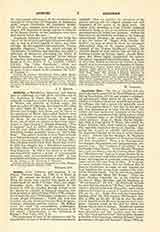

Andrés, JUAN, littérateur and historian, b. at Planes, Valencia, Spain, in 1740; d. in Rome in 1817. He entered the Society of Jesus in 1754. When the Jesuits were expelled from Spain in 1767 Andres made his abode at Ferrara (Italy) and taught philosophy there. After the suppression of the Society in 1773 he travelled through Europe to collect matter for a history of universal literature; this work he wrote at intervals from 1782 to 1799, and published under the title “Dell’origine, progresso e stato attuale d’ogni letteratura”. Under this title was included not only literature but also Holy Scripture, theology, philosophy, and the sciences. Mr. Hallam styles the work “an extraordinary performance, embracing both ancient and modern literature in its full extent” (“Introduction to the Literature of Europe“, New York, 1842, I, 8).
The inexactness of some of the statements and the superficiality of some of Andres’s criticisms are almost negligible when we consider the cleverness of the general surveys and the original remarks met with frequently in the course of his great work. His Italian style, according to Cian (Gesuiti spagnuoli letterati in Italia, p. 15), is not inferior to that of his contemporaries for charm and clearness. Andres has been severely criticized for ascribing to the Arabs an extraordinary influence on modern poetry. He is also the author of “Saggio della filosofia del Galileo”, an essay in which he shows the systematic philosophical ideas of the famous scientist. The volumes of his “Cartas familiares” evidence the versatile genius of their author, and are full of interesting reviews on literary topics. Joseph Bonaparte and Murat highly appreciated his talents. The former appointed him royal librarian. At the age of sixty-four Andres reentered the Society of Jesus shortly after its restoration in the kingdom of Naples.
W. FURLONG

